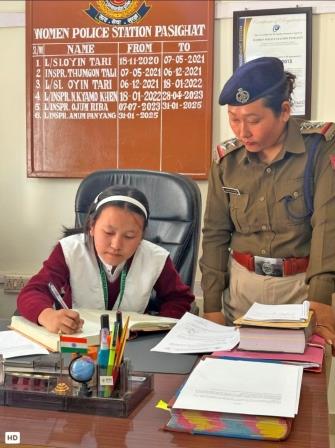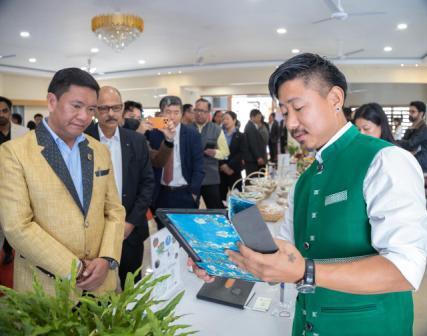-
Sona reviews PMGSY, VVP projects in Itanagar Circle
-
Lok Bhavan celebrates UP Diwas
-
 KGBV student leads WPS Pasighat on National Girl Child Day
KGBV student leads WPS Pasighat on National Girl Child Day
-
Meritorious students felicitated on National Girl Child Day
-
Awareness on POCSO held as part of National Girl Child…
-
Anini certifies 79 Nature Guides on National Tourism Day
-
 Startup success stories reflect potential of state’s youth: CM
Startup success stories reflect potential of state’s youth: CM
-
 Mein participates in vintage Willys Jeep Rally, inaugurates World War…
Mein participates in vintage Willys Jeep Rally, inaugurates World War…
-
DG Assam Rifles visits Khonsa Battalion
-
Governor advises DGP to take firm action on illegal migration
During the current Covid times when the digital mode has been accepted almost unanimously as the only route left for continuance of school education, the set of guidelines titled ‘Pragyata’, released on Tuesday by the HRD Ministry was a much needed one. The guidelines in terms of its overall content is comprehensive, but, one of its significant aspects are the suggestions for limiting screen times both for students and teachers. This has been a growing demand both from the academic fraternity and parents as it was felt that absence of a central framework is resulting in haphazard functioning and progress of the newly-embraced online teaching-learning mode. Reactions of parents also suggest that they are particularly worried about the impact on health of their wards due to prolonged exposure to screens. It’s no doubt the document can mitigate the emerging school education challenges due to Covid-19 pandemic to a reasonable extent. But, much will depend on its acceptance by the respective schools in states, as it’s only advisory in nature and not legally or administratively binding.
The 46-page document prepared by the NCERT has enumerated the broad guidelines for School Heads, teachers, parents and students for implementation of the digital education regime, a new concept altogether in the Indian school education context. But the most welcoming feature is the setting out of screen time limits for pupils as well as teachers, which, among other things, is counted as an important pedagogical component in ensuring the qualitative aspects of the new mode. The ideal daily time frames suggested are- not more than 30 minutes for pre-primary kids, a maximum of two sessions each having 45 minutes for Class I-VIII students and not more than four sessions each having 45 minutes for Class IX-XII students. The central objective is to make sure that school students, irrespective of the classes they are studying are not deprived of their vital needs such as sleeping, playing, interacting with families and friends etc. It is necessary to make an honest observation that even if the idea is in its infancy in India and is just a couple of months old, erratic implementation, without paying any reasonable heed to the academic absorbing capacities of the pupils are being attempted, just with the sole motive of covering the syllabi left-over due to the pandemic. The HRD Ministry will be further appreciated if it maintains a steady vigil over the implementation part of this framework which is important since it involves the academic aspirations of over 240 million pupils.
And although non-binding, all schools, government or private across states should accept it as a guidebook for furtherance of online education, which, in all likelihood, is going to have a simultaneous existence with the traditional classroom-based teaching-learning mode.

Kenter Joya Riba
(Managing Editor)She is a graduate in Science with post graduation in Sociology from University of Pune. She has been in the media industry for nearly a decade. Before turning to print business, she has been associated with radio and television.
Email: kenterjoyaz@easternsentinel.in / editoreasternsentinel@gmail.com
Phone: 0360-2212313

